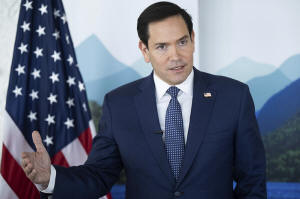America's European allies are trying to pry their unspent money back
from USAID
[March 24, 2025] By
ELLEN KNICKMEYER, JAMEY KEATEN, MIKE CORDER AND VANESSA GERA
Three European allies provided millions of dollars that the United
States was supposed to spend for low-income countries. Then the Trump
administration and Elon Musk's government-cutters arrived.
Government officials from Sweden, Norway and the Netherlands told The
Associated Press that a combined $15 million they contributed for joint
development work overseas has been parked at the U.S. Agency for
International Development for months.
After the Republican administration and Musk's Department of Government
Efficiency cut USAID’s funding and the bulk of its programs, the
Europeans asked whether their money would be funneled to projects as
expected or refunded.
They have gotten no response.
“It’s a concern for us, especially as we want our partner organizations
to be compensated for the work they have put into the programs,” said
Julia Lindholm, a spokeswoman for the Swedish government’s international
development agency.
The true total may be larger. Other foreign governments also had money
entrusted with USAID for distribution in a range of joint development
projects at the time President Donald Trump ordered the funding freeze
on Jan. 20, according to an official directly familiar with the matter
who was not authorized to comment publicly and spoke on condition of
anonymity.
The worries point to the extent to which the new administration's abrupt
cutoff of foreign assistance and canceling of contracts for humanitarian
and development work are raising questions about Washington's financial
reliability. They also show further strain between allies as Trump
revamps American foreign policy.

The State Department and USAID did not immediately respond to questions
asking how many foreign governments had money for joint development
programs going unspent and unrefunded in the USAID funding freeze, how
much money that was in total, and whether the administration was doing
anything about it.
Concerns from American allies
Sweden, Norway and the Netherlands had been partnering with USAID on a
project called Water and Energy for Food, or WE4F. It helps farmers and
others in poorer countries develop innovative ways to grow more food
without straining water supplies or depending on climate-damaging forms
of energy.
“Most importantly," Lindholm said by email, the U.S. failure so far to
disburse or refund allies' donations is harming ”6 million of the
poorest and most vulnerable farmers in the world who are dependent on
the technologies for their food production and food security."
Other administration actions already have alarmed traditional partners.
Trump has said he would not necessarily follow the mutual-defense pact
underlying the NATO security agreement, he has advanced some of Russia's
talking points and demands in its invasion of Ukraine and has imposed
tariffs on Canada, the European Union and others.
America as a reliable financial partner
Now, doubts about the U.S. as a reliable business partner have emerged
in lawsuits over the administration's abrupt cancellation of what
Secretary of State Marco Rubio said were 83% of USAID contracts, forcing
partner organizations to lay off workers and driving some out of
business.
In a brief supporting a lawsuit from federal workers, former Defense
Secretaries Chuck Hagel and William Perry, former CIA Director Michael
Hayden and more than a dozen other former senior U.S. officials said the
administration's mass canceling of thousands of USAID contracts was
flouting U.S. financial regulations and “destroying the United States'
credibility as a reliable partner.”
Canceling the contracts "sends a message that this administration does
not feel bound by those regulations — regulations on which every
business that works with the United States relies," the former officials
said.
[to top of second column] |

US Secretary of State Marco Rubio speaks with reporters following
the G7 foreign ministers meeting in La Malbaie, Quebec, Canada, on
Friday, March 14, 2025. (Saul Loeb, Pool Photo via AP)
 In another case, lawyers for
nonprofits and businesses seeking payment from USAID told a judge
that because of the financial chaos surrounding the agency's
dismantling, banks have stopped what used to be routine financing
for USAID partners based on their contracts with the U.S. agency.
Since the Cold War, the national security argument for development
programs has been that making poorer countries more prosperous and
stable lessens refugee flows and conflicts.
Trump and Musk call foreign assistance through USAID in particular a
fraud and scam. Administration officials are looking at focusing
U.S. development efforts much more narrowly on combating China's
influence abroad and boosting U.S. trade and business opportunities.
Seeking money back from the Trump administration
Growing steadily more alarmed by the administration's foreign aid
moves, Sweden, Norway and the Netherlands initially sent USAID
emails inquiring about the money they had parked in USAID accounts.
Frustrated at getting no response, two of them warned in the
government-to-government emails that they were looking at talking to
local media about their missing money, according to the official
directly familiar with the matter.
Under court order, the administration has started making good on
some $2 billion USAID already owed when Trump ordered the freeze in
USAID and State Department foreign assistance on Inauguration Day.
But forced leaves and firings have yanked most officials and workers
at USAID's headquarters off the job. That includes many who oversaw
development programs and would be involved in tracking down numbers
and calculating any refunds for the foreign governments.
Sweden's development agency told the AP that it estimates it has $12
million total, including $5.1 million for WE4F, sitting in USAID
accounts — money going unspent for people in Africa, Asia and the
Middle East and unrefunded by the administration.
Lindholm, the spokesperson for Sweden’s development agency, called
the WE4F program “extraordinarily impactful,” with measurable
benefits for farmers and others many times greater than the
program’s initial targets.

The Norwegian Agency for Development Cooperation told the AP that it
has received no information about the fate of a $1.4 million funding
tranche for WE4F since Trump began dissolving USAID.
The Dutch Foreign Ministry said it reached out to the U.S. aid
agency on how much of the $1.6 million it had given most recently
for WE4F had yet to be disbursed by USAID and should be refunded,
but that it had not yet gotten any response.
"Donor partners are now exploring other opportunities to continue to
run the WE4F programme to ensure a responsible completion,” Lindholm
said by email.
___
Knickmeyer reported from Washington, Keaten from Geneva, Corder from
The Hague, Netherlands, and Gera from Warsaw, Poland.
All contents © copyright 2025 Associated Press. All rights reserved
 |